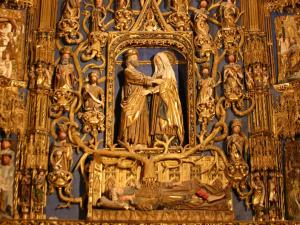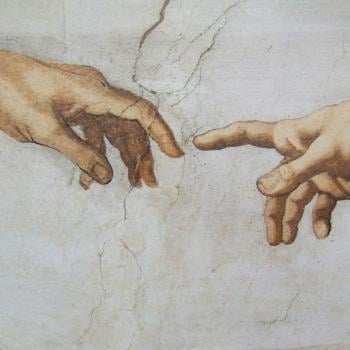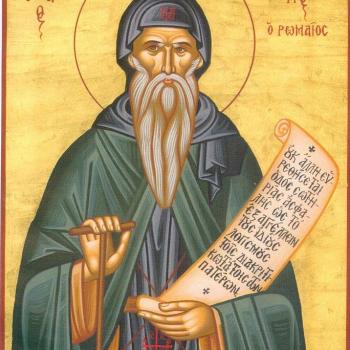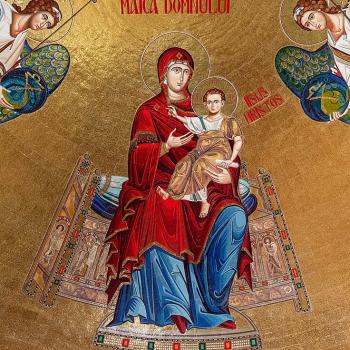Today the bonds of barrenness are loosed; for God listened to Joachim and Anne. He promised them – although it was beyond hope – that they should bear a divine child. From this child was born incarnate the Infinite God, Who told the Angel to cry to her: Rejoice, full of grace; the Lord is with thee (Troparion of the Conception of St. Anne).

The conception of St. Anne, an elderly woman who had been barren all her life, was not only a great miracle in and of itself, but it was also a sign of what was to come. For, as St. Gregory Palamas explained, through her, the Mother of God was to be born. Humanity, which had been spiritually barren, found itself no longer barren when the Virgin Mary was conceived. Through the miracle of her her conception, the barren nature of humanity has been overturned:
Why did she come from a barren womb? In order to put an end to her parents’ sorrow, transform their disgrace, and prefigure that deliverance from the grief and curse of the forefathers of the human race, which was to come about through her.[1]
As all true work of God with humanity brings grace with it, there should be no surprise that there was great grace involved when Mary was conceived. She was the sign that the work of God through the children of Israel had achieved its goal. God had healed humanity with his grace, allowing the woman of great promise, the woman spoken about in prophecy, to be conceived. Through her, humanity was to give itself over to God; through her, God would become man. The grace was hers, not as if it were some fiat of God done out of context of human history, but rather, it was hers through the long direction of God with the people of Israel. God slowly arranged her birth with his work with the people of Israel, and the sacraments given to them through Moses, allowing the spiritual curse which affected the whole of humanity (and creation itself) could be overturned. Thus, Vladimir Lossky, recounted:
The whole development of the Old Testament with its successive elements – the election of Noah, the election of the stock of Abraham, the election of the people of Israel, the election of the tribe of Judah, the election of the House of David, the law which preserved the purity of the people of God, the blessings on the chosen descendants, the whole of this sacred history appears as a providential and Messianic process, as a preparation of the Body of Christ, of the Church – the very focal point of union with God, and above all a reparation of Her who was to lend her human nature so that the mystery of the incarnation could be realized.[2]
Mary, glorifying her parents, thus, glorifies humanity as a whole; her parents, who once felt the shame of childlessness, have been glorified by the place they have been given in salvation history. Likewise, as they find themselves going from shame to glory, humanity as a whole can go from such shame to glory. Her parents, to be sure, were righteous, but the righteousness of humanity requires God’ s grace to elevate it and let it achieve its proper end in and with God.
The glory of Mary, which is also the glory of her parents and the glory of humanity as a whole, could not have come about without either the grace of God, or after her birth, her constant and perfect cooperation with God. She was sinless then, because of grace, but not just because of it: grace perfects nature, but only when those given it cooperate with it. God does not force people with his grace to become perfect, he only gives them the opportunity and means by which such perfection can be achieved. But because she was brought about as the glory of humanity, so she was graced, not only from the time of her conception, but also from the grace given to her ancestors which was passed down and shared with her. Likewise, filled with such grace, she still had the choice to deny it, to turn away from it, but instead, she chose always to cooperate with it, finding herself constantly preserving the gift given to her. Sergius Bulgakov, talking about this, suggests she showed herself willing to follow God in and through many trials (or tests) in her life:
It is self-evident that this personal sinlessness is not realizable by human powers alone without the grace of God. Yet, even grace does not accomplish it mechanistically but by the participation, with the efforts and ascetic struggles of a human being who in sin has preserved the sophianicity of his being, the nobility of his origin, and his lofty predestination. In this, and only in this sense can and must it be said that the Most Pure by a special grace of God was preserved from every sin, whether committed in deed or by intention. By the grace of God which filled in her own personal effort, no sinful assault whatsoever, no sinful desire, ever touch her most immaculate soul. She was accessible to temptations only as trials in keeping with the infirmity of her human nature, but not as transgression entering inside and poisoning her heart their venom and staining it. [3]
St. Anthony of Padua, explaining this, likewise said:
Full of grace. He who overfills a brimming vessel loses what he pours in. If the soul is full of grace, there is no room for the uncleanness of sin to enter. Grace wholly occupies it, leaving not the least empty corner into which the contrary might enter or remain. [4]
She could have denied the grace, and emptied herself of it, by not cooperating with it; but as she cooperated with it and engaged it, she was found not only to be full of grace (and therefore having no room for sin to cross her mind), but she was also continuously growing in grace, becoming greater and greater, until at last she was at last ready to receive the Word of God within and become, as it were, a second heaven greater than the first:
Second heaven, in whose womb the Lord of heaven dwelt
and shone forth from her to expel darkness from the lands. [5]
Some might doubt this; how can we know she was full of grace throughout her entire life? St. Gregory Palamas, once again, tells us how: we can judge by the fruit of her womb, Jesus:
If a tree is known by its fruit, and a good tree brings forth good fruit (cf. Matt. 7:17; Luke 6:43-44), how could she who is the Mother of Goodness itself, who gave birth to that Beauty which has no beginning, nor be incomparably more excellent and beautiful than anything good on earth and in heaven? The power who made all things fair, to the co-sempiternal, express Image of Goodness, the pre-eternal, supraessential and supremely good Word of the Father most high, wished in His ineffable love and compassion for mankind to put on our image, in order to recall our human nature, which had been dragged down into the inmost recesses of Hades, to renew it after it had grown old, and to raise it up beyond the heavenly heights to His kingdom and divinity. [6]
That she gave birth to the God-man, that her fruit is shown to all to be Jesus himself, should tell us the kind of judgment we should have of her. How can she be anything less than the greatest of all humanity, how can she be anything but full of grace, if in her womb, God was to dwell as if in a second heaven?
If there had been a spot in her soul or a defect,
He would have sought for Himself another mother in whom there is no blemish.[7]
God prepared a place for himself among humanity, building up the people of Israel until at last, Mary was born, making the time right for the incarnation:
Fair palace which the King built and entered and dwelt in it;
the doors were not opened before Him when He was going out.[8]
But we must understand, as the people of Israel were slowly engaged by God through the sacraments given to Moses so that Mary could be the result, we must realize that she also serves as a sign for us and our lives. We too should be built up by God, by the sacraments of the New Covenant, so that we can go from our spiritual barrenness to being full of grace like her. For though there is a special privilege and glory given to her in that she was to be entirely free from sin all her life, we must not think that only she can become full of grace and free from sin. She is the sign that humanity can truly become full of grace, becoming temples of God in which God dwells. She is the exemplar of the new humanity, from her conception to her death and assumption, showing us truly the way of grace and where grace shall lead us if we follow it with all our heart and soul. For the one true supersubstantial bread, Christ himself, is capable of being given to all, and shared by all, so that we can share in the glory which he gave to Mary:
Now they had forgotten to bring bread; and they had only one loaf with them in the boat. And he cautioned them, saying, “Take heed, beware of the leaven of the Pharisees and the leaven of Herod.” And they discussed it with one another, saying, “We have no bread.” And being aware of it, Jesus said to them, “Why do you discuss the fact that you have no bread? Do you not yet perceive or understand? Are your hearts hardened? Having eyes do you not see, and having ears do you not hear? And do you not remember? When I broke the five loaves for the five thousand, how many baskets full of broken pieces did you take up?” They said to him, “Twelve.” “And the seven for the four thousand, how many baskets full of broken pieces did you take up?” And they said to him, “Seven.” And he said to them, “Do you not yet understand?” (Mk. 8:14-21 RSV).
Do we understand yet? Do we understand how we are to partake of the true bread? Do we understand how we can have Christ within us? Do we realize that we can spiritually give birth to Christ, even though Christ himself was born of the Virgin Mary? Do we understand that when we partake of communion, Christ partakes of us, and so just like he did with the Virgin Mary, he makes room for himself in us and with us so that we can then receive the deifying grace which leads us to the kingdom of God? “Beautiful in humility, beloved by charity, sweet in contemplation, comely in virginity, like the heavenly Jerusalem wherein God dwells, and the Virgin was his dwelling place.”[9] We, too, can be his dwelling place, and so we too, can give forth Christ as our spiritual fruit and be glorified. But this true only if we, following the example of Mary, the sign and exemplar for humanity, cooperate with the grace which we have been given. We might not be personally sinless all our lives like Mary, but we can be elevated by grace and find ourselves healed from the damage which our sins have done to us, so that we too can become full of grace, no longer spiritually barren. The joy of Sts. Joachim and Anne, thus, can be our joy, even as we today, share in their joy as we recognize the great things God has done with humanity through them.
[1] St. Gregory Palamas, “On the Birth of the Mother of God,” in The Homilies. Trans. Christopher Veniamin (Waymart, PA: Mount Thabor Publishing, 2009), 335-6.
[2] Vladimir Lossky, The Mystical Theology of the Eastern Church. Trans. Members of the Fellowship of St. Alban and St. Sergius (Crestwood, NY: St. Vladimir’s Seminary Press, 1976; repr. 2002), 140.
[3] Sergius Bulgakov, The Burning Bush. Trans. Thomas Allan Smith (Grand Rapids, MI: William B Eerdmans Publishing Company, 2009), 43.
[4] St. Anthony of Padua, Sermons for Sundays and Festivals. Volume IV. trans. Paul Spilsbury (Padua: Edizioni Messaggero Padova, 2010), 169.
[5] Jacob of Serug, “Homily I” in On the Mother of God. Trans. Mary Hansbury (Crestwood, NY: St. Vladimir’s Seminary Press, 1998), 18.
[6] St. Gregory Palamas, “Delivered on the Feast of the Entry of our Exceedingly Pure Lady, the Mother of God, Into the Holy of Holies,” in The Homilies. Trans. Christopher Veniamin (Waymart, PA: Mount Thabor Publishing, 2009), 407.
[7] Jacob of Serug, “Homily I.” 26.
[8] Jacob of Serug, “Homily I,” 19.
[9] St. Anthony of Padua, Sermons for Sundays and Festivals. Volume IV, 160.
Stay in touch! Like A Little Bit of Nothing on Facebook.
If you liked what you read, please consider sharing it with your friends and family!













